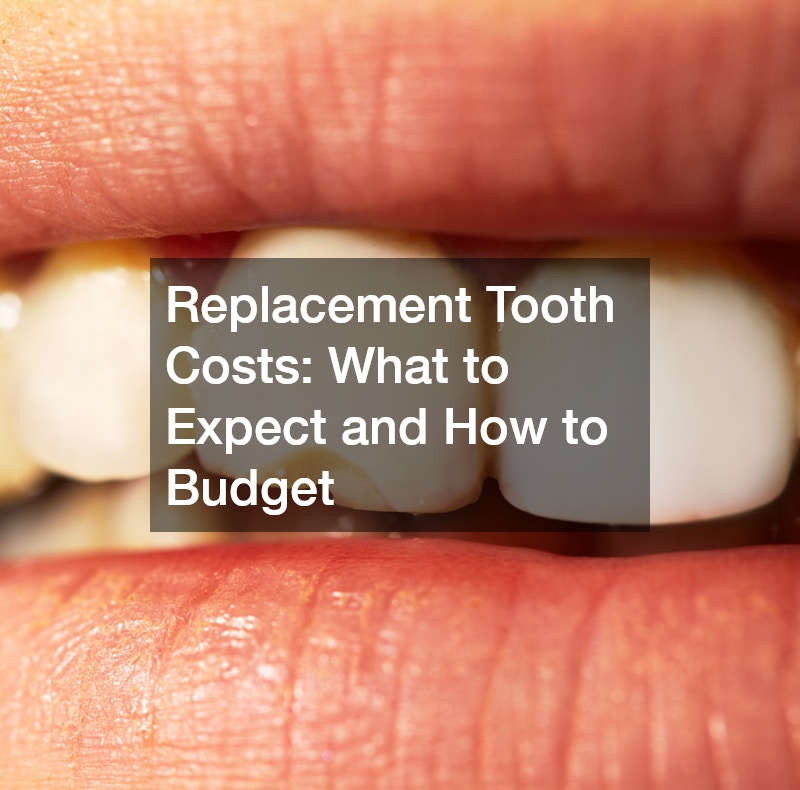
Losing a single tooth can be an upsetting experience both functionally and cosmetically. Modern dentistry provides a range of options for replacing missing or damaged teeth. This allows you to regain your confidence and smile. When planning to replace a tooth, the cost is a crucial consideration. The cost of a replacement tooth can vary greatly depending on its type, the materials used and any additional treatments required. This article provides information on the cost of tooth replacements and offers tips for budgeting.
Factors Influencing Replacement Tooth Costs
It’s important to know the factors that affect the cost of replacing a tooth before diving into the numbers:
Dental implants, dentures and bridges are the most common types of replacement. Each has a different price range and associated procedures.
Material: Materials like zirconia or porcelain are more expensive than the basic materials, but they offer better durability and aesthetics.
Dental costs are affected by the location of the practice and the quality of life in the locality. Urban clinics usually charge more than rural practices.
Expertise of the Dentist: Specialists who have extensive training and experience can charge more for their services.
Additional Procedures: Treatments such as bone grafting and tooth extraction might be required before the replacement procedure, increasing the cost.
Understanding the costs of common replacement options
1. Dental Implants
Due to their natural look and durability, dental implants are considered the gold standard in tooth replacement. The procedure involves placing a titanium implant in the jawbone that acts as a root replacement, and then attaching a dental crown.
Cost: $3000 to $5,000 for each tooth. (Costs may be higher if other procedures, such as bone grafting, are needed).
Factors that affect cost: the type of implant used, the material of crown, and complexity of surgery.
Cons: Does not preserve jawbone health.
Cons: High initial costs and longer treatment times.
2. Dental Bridges
A fixed dental bridge uses adjacent teeth to anchor an artificial tooth. Bridges are a good option for those who want a non-surgical treatment.
Cost: From $1,500 up to $3,500 (depending on how many teeth are replaced and the materials used).
The type of bridge you choose (traditional, Maryland, or cantilever) and the material used for the crowns will affect the cost.
Pros: Faster procedure, less invasive than implant.
Cons: Implants have a shorter lifespan than natural teeth and may affect the adjacent teeth.
3. Dentures
Dentures are removable devices that replace several missing teeth. Dentures come in two different types: partial dentures that fill the gaps left by missing teeth and full dentures which replace a whole arch of teeth.
Cost: $300-$5,000 (depending on if the dentures are full, partial or implant-supported).
The cost of dentures is affected by the material quality, custom fit, and whether it’s conventional or instant.
Cons: High upfront costs, but non-invasive.
Cons: Needs regular adjustments and is less stable than bridges or implants.
Budgeting for a replacement tooth
To manage the cost of a tooth replacement, it is important to plan ahead. Here are a few practical tips for budgeting effectively:
1. Learn about Dental Insurance Coverage
Most dental insurance policies cover a portion of the cost for tooth replacement. Most policies cover procedures such as bridges and dentures. It’s also important to check your policy as some plans include a portion of the cost of implants.
2. Consider Payment Plans
Most dental clinics provide financing options that allow you to pay in installments for your procedures. CareCredit, a company that specializes in financing healthcare treatments, makes them more accessible to patients without the need for hefty upfront payments.
3. Find Discounts and Promotions
Dental clinics often offer discounts or promotions to new patients. Dental schools also offer reduced-priced services under the supervision experienced professionals.
4. Prioritize Preventive Care
Preventive dental care such as regular cleanings or checkups can help reduce the risk of serious dental issues that could lead to tooth loss. Preventive dental care is not only good for your health, but it’s also cost-effective.
5. Plan for long-term costs
Implants may be more expensive initially, but their long-term durability makes them an increasingly cost-effective option. Dentures and bridges may need to be replaced or adjusted, so consider these costs when making your choice.
Why it’s Worth Investing In A Replacement Tooth
The cost of replacing one tooth can be high, but the benefits are often greater than the costs. Replacement teeth can enhance your appearance, as well as your ability to speak, eat and maintain good oral hygiene. Replacing missing teeth can also prevent further dental problems, such as jawbone degeneration or shifting of adjacent teeth.
Final Thoughts
The cost of a tooth replacement depends on a number of factors including the type, material, and any additional procedures. Each of the three options – dental implants, bridges, or dentures – has its own benefits and price ranges. It is important to select a solution which fits your budget and meets your needs.
You can make the whole process more affordable by exploring your insurance options, financing plans and preventive care. Remember that investing in a new tooth is an investment for your health, self-confidence, and quality life.
.

